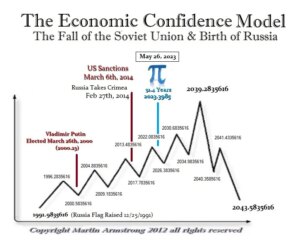Understanding the Complexities of Ukraine’s Future: Insights from Extreme Investor Network

The ongoing geopolitical crisis surrounding Ukraine has sparked intense discussion and debate among political figures and analysts alike. One striking viewpoint comes from Romania’s Calin Georgescu, who has recently gained attention for labeling Ukraine a “fictitious state.” His provocative statements raise important questions about national identity and geopolitical realities in Eastern Europe.
Georgescu, who narrowly missed becoming Romania’s president due to political maneuvering, claims, “One hundred percent. This will happen one hundred percent. There is no other way. This path is inevitable.” His assertion that Ukraine is an artificial construct dates back to its inception as the Ukrainian Soviet Socialist Republic. In his view, the world is witnessing a shift that will inevitably rearrange borders, including those of Ukraine.
A Fragmented Future?
Georgescu posits that parts of Ukraine may eventually be absorbed by Romania and other neighboring nations. He cites historical regions like Northern Bukovina and Budzhak, emphasizing that a failure to honor agreements such as the Minsk Agreement led to escalating tensions between Ukraine and Russia. This treaty aimed to address territorial disputes, allowing local populations to have a voice in their political alignment – a point that highlights the dire consequences of unresolved tensions.
The historical context is crucial. Ukraine officially gained independence on August 24, 1991, following the collapse of the Soviet Union. A referendum held later that year resulted in a staggering 90.3% support for independence. While the dissolution of the USSR birthed multiple independent states, the resulting chaos and economic instability sowed the seeds for future conflict.
The Bigger Picture: Economic Impacts and Global Inequality

The current war has reverberated beyond Ukraine’s borders, creating a global economic crisis that threatens inflationary pressures worldwide. The involvement of military alliances like NATO has further complicated matters, drawing other major economic players into the fray. Countries in the European Union are already feeling the sting of sanctions and geopolitical tensions, leading to disparities that could fuel resentment and discord.
As we dissect the implications of this ongoing crisis, it’s essential to understand the cyclical nature of geopolitical power dynamics. History shows us that civilizations invariably face collapse, leading to the redrawing of borders and the emergence of new nations. The disintegration of both the Soviet Union and Yugoslavia in the early 1990s mirrored the current dynamics we see unfolding today.
Looking Forward: The Sixth Wave and Paradigm Shifts

Crucially, we stand on the precipice of a transformative period characterized by the conclusion of the Sixth Wave in 2032. Historically, such epochs trigger profound economic and political changes, often rooted in widespread dissatisfaction with existing governance structures.
By 2026, signals will likely indicate a paradigm shift as populations increasingly express disillusionment with government forms. We should brace ourselves for a potential eruption of new social movements and ideologies, peaking around 2029, with significant demands for change by 2032. It’s a reflection of the populace’s capacity for adaptation and transformation in the face of adversity.
Conclusion: Embracing the Uncertain Future
At Extreme Investor Network, we pride ourselves on delivering deep insights into socio-economic transformations and their impacts on investment strategies. As we navigate the complexities of today’s geopolitical landscape, remember that historical context and economic analysis provide invaluable tools for understanding and adapting to our ever-changing world.
Stay tuned for more updates as we track the evolving narrative and its implications on the global arena. Whether you’re an investor, a policy enthusiast, or simply someone seeking to comprehend the world’s dynamics, being informed is your greatest asset.

